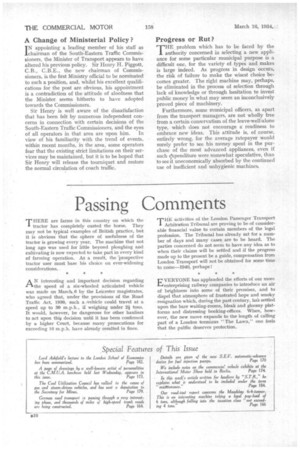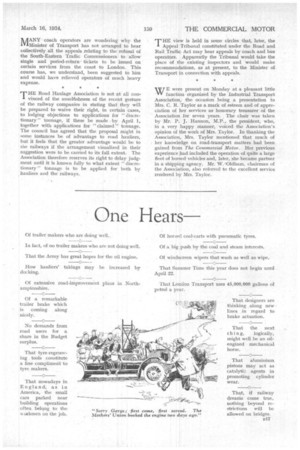Passing Comments
Page 26

Page 27

If you've noticed an error in this article please click here to report it so we can fix it.
THERE are farms in this country on which the
I tractor has completely ousted the horse. They may not be typical examples of British practice, but it is obvious that the sphere of usefulness of the tractor is growing every year. The machine that not long ago was used for little beyond ploughing and cultivating is now expected to take part in every kind of farming operation. As a result, the 'prospective tractor user must base his choice on ever-widening considerations.
AN interesting and important decision regarding the speed of a six-wheeled articulated vehicle was made on March 6 by the Leicester magistrates, who agreed that, under the provisions of the Road Traffic Act, 1930, such a ,vehicle could travel at a speed up to 30 m.p.h., if weighing under 21 tons. It would, however, be dangerous for other hauliers to act upon this decision until it has been confirmed by a higher Court, because many prosecutions for exceeding 16 m.p.h. have already resulted in fines. THE activities of the London Passenger Transport Arbitration Tribunal are proving to be of considerable financial value to certain members of the legal profession. The Tribunal has already sat for a number of days and many cases are to be heard. The parties concerned do not seem to have any idea as to when their claims will be settled and if the progress made up to the present be a guide, compensation from London Transport will not be obtained for some time to come-1940, perhaps EVERYONE has applauded the efforts of our more 1—ienterprising railway companies to introduce an air of brightness into some of their premises, and to dispel that atmosphere of frustrated hope and smoky resignation which, during the past century, ha's settled upon the bare waiting-rooms, bleak and gloomy platforms and distressing booking-offices. When, however, the new move expands to the length of calling part of a London terminus "The Lawn," one feels that the public deserves protection. 1‘11ANY coach operators are wondering why the IVIMinister of Transport has not arranged to hear collectively all the appeals relating to the refusal of the South-Eastern Traffic Commissioners to allow single and period-return tickets to be issued on certain services from the coast to London. This course has, we understand, been suggested to him and would have relieved operators of much heavy expense.
HE Road Haulage Association is not• at all con vinced of the unselfishness of the recent gesture of the railway companies in stating that they will be prepared to waive their right, in certain cases, to lodging objections to applications for " discretionary " tonnage, if these be made by April 1, together with applications for " claimed " tonnage. The council has agreed that the proposal might in some instances be of advantage to road hauliers, but it feels that the greater advantage would be to the railways if the arrangement visualized in their suggestion were to be carried to its full extent. The Association therefore reserves its right to delay judgment until it is known fully to what extent " discretionary " tonnage is to be applied for both by hauliers and the railways.
THE view is held in some circles that, later, the 1Appeal Tribunal constituted under the Road and Rail Traffic Act may hear appeals by coach and bus operators. Apparently the Tribunal would take the place of the existing inspectors and would make recommendations, as at present, to the Minister of Transport in connection with appeals.
WE were present on Monday at a pleasant little function organized by the Industrial Transport Association, the occasion being a presentation to Mrs. C. R. Taylor as a mark of esteem and of appreciation of her services as honorary treasurer of the Association for seven years. The chair was taken by Mr. P. J. Hannon, M.P., the president, who, in a very happy manner, voiced the Association's opinion of the work of Mrs. Taylor. In thanking the Association, Mrs. Taylor mentioned that much of her knowledge on road-transport matters had been gained from The Commercial Motor. Her, previous experience had included the operation of quite a large fleet of horsed vehicles and, later, she became partner in a shipping agency. Mr. W.•Oldham, chairman of the Association, also referred to the excellent service rendered by Mrs. Taylor.




















































































